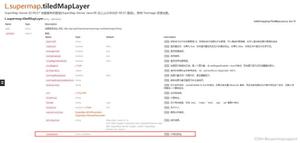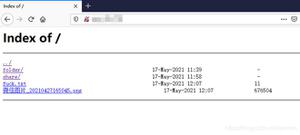Linux搭建NFS服务(基础) [操作系统入门]

【RHEL8】—NFSserver ;【Centos7】—NFSclient
!!!测试环境我们首关闭防火墙和selinux(NFSserver和NFSclient都需要)
[[email protected] ~]# systemctl stop firewalld[[email protected] ~]# systemctl disable firewalld
[[email protected] ~]# sed -i ‘s/SELINUX=enforcing/SELINUX=disabled/g‘ /etc/selinux/config
[[email protected] ~]# setenforce 0
前言
1、NFS服务介绍
1??:NFS—Network File System—网络文件系统
2??:主要用于linux系统上实现文件共享的一种协议,其客户端主要是Linux
3??:企业应用:为集群中的web server提供后端存储
4??:没有用户认证机制,且数据在网络上传送的时候是明文传送,一般只能在局域网中使用 支持多节点同时挂载及并发写入
5??:一般只在局域网中使用
2、NFS服务的组件
1??:RPC(Remote Procedure Call Protocol):远程过程调用协议,它是一种通过网络从远程计算机程序上请求服务,不需要了解底层网络技术的协议。
2??:客户端工具:(1)Linux系统:showmount 、mount.nfs;(2)Windows系统:无
3、NFS服务概述
1??:服务全称:Network File System,网络文件系统
2??:服务功能:在类UNIX主机之间共享目录和文件资源
3??:服务模式:客户机/服务器工作模式
4??:软件包名:rpcbind 和 nfs-utils
rpcbind:负责NFS的数据传输,远程过程调用
nfs-utils:控制共享哪些文件,权限管理
5??:进程名称:rpcbind 、rpc.nfsd 、rpc.mountd、 exportfs
6??:进程端口:服务器端RPC(111) 、NFS(随机)
一、NFS服务端安装NFS服务
1、首先查看一下服务端IP
[[email protected] ~]# ifconfigens160: flags=4163<UP,BROADCAST,RUNNING,MULTICAST> mtu 1500
inet 10.0.0.140 netmask 255.0.0.0 broadcast 10.255.255.255
inet6 fe80::fa13:32e0:3b9f:2196 prefixlen 64 scopeid 0x20<link>
ether 00:0c:29:cd:6a:1b txqueuelen 1000 (Ethernet)
RX packets 5419 bytes 465927 (455.0 KiB)
RX errors 0 dropped 0 overruns 0 frame 0
TX packets 3930 bytes 558300 (545.2 KiB)
TX errors 0 dropped 0 overruns 0 carrier 0 collisions 0
lo: flags=73<UP,LOOPBACK,RUNNING> mtu 65536
inet 127.0.0.1 netmask 255.0.0.0
inet6 ::1 prefixlen 128 scopeid 0x10<host>
loop txqueuelen 1000 (Local Loopback)
RX packets 594 bytes 50308 (49.1 KiB)
RX errors 0 dropped 0 overruns 0 frame 0
TX packets 594 bytes 50308 (49.1 KiB)
TX errors 0 dropped 0 overruns 0 carrier 0 collisions 0
2、安装nfs-utils和rpcbind包
[[email protected] ~]# yum install -y rpcbind nfs-utils[[email protected] ~]# rpm -qa rpcbind nfs-utils
rpcbind-1.2.5-4.el8.x86_64
nfs-utils-2.3.3-26.el8.x86_64
3、先启动rpcbind和nfs,并开启服务(!!!注意:必须先开启 rpcbind 然后再开启 nfs ,否则会出现问题!!!)
[[email protected] ~]# systemctl start rpcbind[[email protected] ~]# systemctl enable rpcbind
[[email protected] ~]# systemctl start nfs
Failed to start nfs.service: Unit nfs.service not found.
[[email protected] ~]# systemctl start nfs-server
[[email protected] ~]# systemctl enable nfs-server
Created symlink /etc/systemd/system/multi-user.target.wants/nfs-server.service → /usr/lib/systemd/system/nfs-server.service.
[[email protected] ~]# netstat -tunlp
Active Internet connections (only servers)
Proto Recv-Q Send-Q Local Address Foreign Address State PID/Program name
tcp 0 0 0.0.0.0:111 0.0.0.0:* LISTEN 1/systemd
tcp 0 0 0.0.0.0:20048 0.0.0.0:* LISTEN 30223/rpc.mountd
tcp 0 0 0.0.0.0:52373 0.0.0.0:* LISTEN 28778/rpc.statd
tcp 0 0 0.0.0.0:22 0.0.0.0:* LISTEN 1101/sshd
tcp 0 0 0.0.0.0:35197 0.0.0.0:* LISTEN -
tcp 0 0 0.0.0.0:2049 0.0.0.0:* LISTEN -
tcp6 0 0 :::111 :::* LISTEN 1/systemd
tcp6 0 0 :::20048 :::* LISTEN 30223/rpc.mountd
tcp6 0 0 :::36949 :::* LISTEN -
tcp6 0 0 :::22 :::* LISTEN 1101/sshd
tcp6 0 0 :::41119 :::* LISTEN 28778/rpc.statd
tcp6 0 0 :::2049 :::* LISTEN -
udp 0 0 0.0.0.0:42713 0.0.0.0:* -
udp 0 0 127.0.0.1:970 0.0.0.0:* 28778/rpc.statd
udp 0 0 0.0.0.0:68 0.0.0.0:* 1611/dhclient
udp 0 0 0.0.0.0:111 0.0.0.0:* 1/systemd
udp 0 0 0.0.0.0:20048 0.0.0.0:* 30223/rpc.mountd
udp 0 0 0.0.0.0:40540 0.0.0.0:* 28778/rpc.statd
udp6 0 0 :::111 :::* 1/systemd
udp6 0 0 :::35034 :::* 28778/rpc.statd
udp6 0 0 :::33084 :::* -
udp6 0 0 :::20048 :::* 30223/rpc.mountd
检查守护进程状态/etc/rc.d/init.d/rpcbind status检查服务进程状态
/etc/rc.d/init.d/nfs status
服务进程
4、服务端口查看
[[email protected] ~]# rpcinfo -pprogram vers proto port service
100000 4 tcp 111 portmapper
100000 3 tcp 111 portmapper
100000 2 tcp 111 portmapper
100000 4 udp 111 portmapper
100000 3 udp 111 portmapper
100000 2 udp 111 portmapper
100024 1 udp 40540 status
100024 1 tcp 52373 status
100003 3 tcp 2049 nfs
100003 4 tcp 2049 nfs
100227 3 tcp 2049 nfs_acl
100021 1 udp 42713 nlockmgr
100021 3 udp 42713 nlockmgr
100021 4 udp 42713 nlockmgr
100021 1 tcp 35197 nlockmgr
100021 3 tcp 35197 nlockmgr
100021 4 tcp 35197 nlockmgr
100005 1 udp 20048 mountd
100005 1 tcp 20048 mountd
100005 2 udp 20048 mountd
100005 2 tcp 20048 mountd
100005 3 udp 20048 mountd
100005 3 tcp 20048 mountd
5、创建共享目录
[[email protected] ~]# mkdir /nfsdir[[email protected] ~]# ll /nfsdir/
总用量 0
6、编辑NFS主配置文件
[[email protected] ~]# vim /etc/exports[[email protected] ~]# cat /etc/exports
/nfsdir 10.0.0.0/24(ro,rw)
//第一次进入该文件为空白文件,需要使用者自行创建
1、/etc/exports文件格式<输出目录> [客户端1 选项(访问权限,用户映射,其他)] [客户端2 选项(访问权限,用户映射,其他)](exprots文件中每一行提供了一个共享目录的设置)2、相关说明1??:输出目录:输出目录是指NFS系统中需要共享给客户机使用的目录;2??:客户端:客户端是指网络中可以访问这个NFS输出目录的计算机;客户端常用的指定方式:
指定ip地址的主机:
192.168.10.10指定子网中的所有主机:
192.168.10.0/24192.168.10.*指定域名的主机:www.test.com.cn
指定域中的所有主机:
*.test.com.cn所有主机:
*3??:选项的种类:
1)、访问权限选项:
设置输出目录只读:ro
设置输出目录读写:rw
2)、用户映射选项:
all_squash:将远程访问的所有普通用户及所属组都映射为匿名用户或用户组(nfsnobody);
no_all_squash:与all_squash取反(默认设置);
root_squash:将root用户及所属组都映射为匿名用户或用户组(默认设置);
no_root_squash:与rootsquash取反;
anonuid=xxx:将远程访问的所有用户都映射为匿名用户,并指定该用户为本地用户(UID=xxx);
anongid=xxx:将远程访问的所有用户组都映射为匿名用户组账户,并指定该匿名用户组账户为本地用户组账户(GID=xxx);
3)、其它选项:
secure:限制客户端只能从小于1024的tcp/ip端口连接nfs服务器(默认设置);
insecure:允许客户端从大于1024的tcp/ip端口连接服务器;
sync:将数据同步写入内存缓冲区与磁盘中,效率低,但可以保证数据的一致性;
async:将数据先保存在内存缓冲区中,必要时才写入磁盘;
wdelay:检查是否有相关的写操作,如果有则将这些写操作一起执行,这样可以提高效率(默认设置);
no_wdelay:若有写操作则立即执行,应与sync配合使用;
subtree:若输出目录是一个子目录,则nfs服务器将检查其父目录的权限(默认设置);
no_subtree:即使输出目录是一个子目录,nfs服务器也不检查其父目录的权限,这样可以提高效率;
no_root_squash:是让root保持权限;
root_squash:是把root映射成nobody,no_all_squash 不让所有用户保持在挂载目录中的权限。
相关说明
7、重启NFS服务
[[email protected] ~]# systemctl restart nfs-server[[email protected] ~]# netstat -tunlp
Active Internet connections (only servers)
Proto Recv-Q Send-Q Local Address Foreign Address State PID/Program name
tcp 0 0 0.0.0.0:111 0.0.0.0:* LISTEN 1/systemd
tcp 0 0 0.0.0.0:20048 0.0.0.0:* LISTEN 30394/rpc.mountd
tcp 0 0 0.0.0.0:52373 0.0.0.0:* LISTEN 28778/rpc.statd
tcp 0 0 0.0.0.0:22 0.0.0.0:* LISTEN 1101/sshd
tcp 0 0 0.0.0.0:2049 0.0.0.0:* LISTEN -
tcp 0 0 0.0.0.0:44931 0.0.0.0:* LISTEN -
tcp6 0 0 :::111 :::* LISTEN 1/systemd
tcp6 0 0 :::20048 :::* LISTEN 30394/rpc.mountd
tcp6 0 0 :::46481 :::* LISTEN -
tcp6 0 0 :::22 :::* LISTEN 1101/sshd
tcp6 0 0 :::41119 :::* LISTEN 28778/rpc.statd
tcp6 0 0 :::2049 :::* LISTEN -
udp 0 0 127.0.0.1:970 0.0.0.0:* 28778/rpc.statd
udp 0 0 0.0.0.0:68 0.0.0.0:* 1611/dhclient
udp 0 0 0.0.0.0:111 0.0.0.0:* 1/systemd
udp 0 0 0.0.0.0:47351 0.0.0.0:* -
udp 0 0 0.0.0.0:20048 0.0.0.0:* 30394/rpc.mountd
udp 0 0 0.0.0.0:40540 0.0.0.0:* 28778/rpc.statd
udp6 0 0 :::111 :::* 1/systemd
udp6 0 0 :::35034 :::* 28778/rpc.statd
udp6 0 0 :::45389 :::* -
udp6 0 0 :::20048 :::* 30394/rpc.mountd
二、客户端访问NFS服务器
1、客户端安装nfs-utils(其实原本需要在客户端安装的工具是showmount和mount.nfs,在安装这两个包时,就是安装的nfs-utils这个包)
[[email protected] ~]# yum install -y nfs-utils[[email protected] ~]# rpm -qa nfs-utils
nfs-utils-1.3.0-0.66.el7.x86_64
[[email protected] ~]# which showmount mount.nfs
/usr/sbin/showmount
/usr/sbin/mount.nfs
//出现命令的路径,说明已经安装
2、客户端查看服务端提供的共享资源
//命令格式:showmount -e 服务器端ip[[email protected] ~]# showmount -e 10.0.0.140
Export list for 10.0.0.140:
/nfsdir 10.0.0.0/24
3、客户端创建需要挂载的目录
[[email protected] ~]# mkdir /sharedir[[email protected] ~]# ll /sharedir/
总用量 0
[[email protected] ~]# df -h
文件系统 容量 已用 可用 已用% 挂载点
/dev/mapper/centos-root 50G 1.1G 49G 3% /
devtmpfs 901M 0 901M 0% /dev
tmpfs 912M 0 912M 0% /dev/shm
tmpfs 912M 8.6M 904M 1% /run
tmpfs 912M 0 912M 0% /sys/fs/cgroup
/dev/mapper/centos-home 27G 33M 27G 1% /home
/dev/sda1 1014M 143M 872M 15% /boot
tmpfs 183M 0 183M 0% /run/user/0
4、客户端访问共享资源
//命令格式:mount -t nfs nfs服务器端ip:/共享目录 挂载点或者
//命令格式:mount.nfs nfs服务器端ip:/共享目录 挂载点
[[email protected] ~]# mount.nfs 10.0.0.140:/nfsdir /sharedir
[[email protected] ~]# df -h
文件系统 容量 已用 可用 已用% 挂载点
/dev/mapper/centos-root 50G 1.1G 49G 3% /
devtmpfs 901M 0 901M 0% /dev
tmpfs 912M 0 912M 0% /dev/shm
tmpfs 912M 8.6M 904M 1% /run
tmpfs 912M 0 912M 0% /sys/fs/cgroup
/dev/mapper/centos-home 27G 33M 27G 1% /home
/dev/sda1 1014M 143M 872M 15% /boot
tmpfs 183M 0 183M 0% /run/user/0
10.0.0.140:/nfsdir 50G 2.0G 49G 4% /sharedir
// 最后一行说明已经挂载成功
三、测试
1、在服务端创建一个文件夹,并写入文件
[[email protected] ~]# cd /nfsdir/[[email protected] nfsdir]# ls
[[email protected] nfsdir]# ll
总用量 0
[[email protected] nfsdir]# touch test.txt
[[email protected] nfsdir]# echo "I am so cool!" > test.txt
2、在客户端查看服务端共享的文件
[[email protected] ~]# cd /sharedir/[[email protected] sharedir]# ls
test.txt
[[email protected] sharedir]# ll
总用量 4
-rw-r--r--. 1 root root 14 7月 29 16:23 test.txt
[[email protected] sharedir]# cat test.txt
I am so cool!
四、拓展
1、客户端开机自动挂载
[[email protected] ~]# vim /etc/fstab.........
10.0.0.140:/nfsdir /sharedir nfs default,_rnetdev 0 0
//在文件的最后写入
Linux搭建NFS服务(基础)
以上是 Linux搭建NFS服务(基础) [操作系统入门] 的全部内容, 来源链接: utcz.com/z/518858.html









